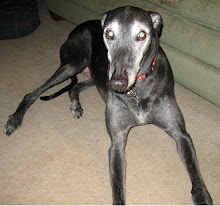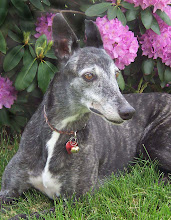While each of my adopted greyhounds has given me many gifts by their loving companionship, the joy of living they exude, and the friends they introduce, they have also each required that I let go of certain things.
Aristotle made me fall completely in love with the breed. After research, it seemed the perfect choice for me on paper, but it wasn't until I finally got to adopt my first greyhound that I knew how perfect they were. After a slow start to the adoption process, bringing Ari home and getting him settled in was a breeze. He fit in to my life incredibly easily. He joyfully welcomed me home from work and was always a ready and willing walking buddy, but he was also just as content to curl up and nap with me on a lazy weekend afternoon. He helped me meet many people in our neighborhood who I'd never had the chance to talk with before. He never gave me any trouble in the form of acting out or destroying things. But, he did teach me that I'd have to let go of my long history of keeping my car spotless. I traded a clean interior for one with dog hairs that wove themselves into the fabric on the ceiling (I could only protect so much with the throw on the backseat), and clear windows and shiny doors for ones with drool marks inside and out. But I was amazed at how easily I said and truly meant that I didn't care because as much as I wanted a clean car, I loved my dog considerably more. It was somewhat shocking to realize how easily I could give up a long-standing belief (that I'd be happy with my car only if I kept it spotless) and put the work of maintaining it behind me (no sense spending hours a couple of weekends a month anymore when a quick go-over would keep it "good enough"). And I was thrilled to have a concrete lesson in how my own thinking could hold me prisoner and the incredible freedom I could enjoy by changing the way I was thinking. Of course, I knew this in the past, but had never before been successful in truly putting a change of thinking so thoroughly and nearly effortlessly into practice.
Bringing Bella home was a little tougher transition. She was sweet (to me, not always so much to Aristotle; she asserted her dominance over him quickly), but she was a bit shy, anxious, and skittish. She seemed not to totally trust people or let her guard down for some time. She made me relinquish my mistaken belief that all adoptions and transitions would be as easy as Aristotle's had been. But she was funny. She made me laugh a lot. From the way she surprised herself playing the piano with her needlenose one day, to the way she bounced rather than walked, to the way she'd carry my slipper socks around the house and curl up with them to sleep (she'd never chew them, only place them on the bed next to her). She taught me that with patience, understanding, and extra doses of love, she would eventually warm up to anyone. Sadly, not long after both she and I learned this lesson, she was diagnosed with osteosarcoma and I had to have her euthanized in just a week because her pain was not controllable. But even in her death, she had another lesson for me, which was that while I wouldn't like it, I would survive the crushing pain of losing her. I had worried for as long as I'd had Ari that when his time came, it would seriously challenge my ability to keep my tendency toward depression under control. While her death was difficult, I learned how to deal with it and was finally convinced deep down that I would always be able to deal with losing my greys, even though it would never be a choice I would want to make.
Canoodle was another easy transition. Within seconds of our meeting, he was nuzzling my leg and I knew I'd found another friend for life. Although capable of short bursts of energy, he is the quietest, most calm grey I've had. He's so quiet that he doesn't even bark when he needs to go out ... he'll just come look at me until I get the message. While my other dogs have lived up to the 40-mile-an-hour-couch-potato description of greyhounds, Canoodle is even more laid back in his couch-potato-ness. The only time he does get agitated is when a storm is coming. About a week and a half after I adopted him, we had a typical summer thunderstorm and the poor guy shook so hard that the floorboards vibrated. I talked with the vet and we tried doggie valium, but it didn't help significantly. When storms hit, I talk to him calmly and reassure him that he's fine and that the storm can't "get" him, but he doesn't return to his normal self until the storm passes. Over the years, he's come to tolerate storms a little better, but he still hides in either the bathroom or between the kitchen cabinets and the island (the two darkest places he has access to) whenever there's a distant rumble. Observing his storm phobia has made me realize how utterly useless the human worry I am prone to be paralyzed by actually is, and now when an attack of anxiety over some (usually un-worry-worthy) thing or another hits, I am making an effort to remind myself that, as a child of God under his protection, the storms of life can't truly hurt me either.
Canoodle has also taught me the effectiveness of passive resistance and made me give up my own misperception of control. To deal with his current problem of muscle tone loss, the vet advised I walk him as much as possible. Sometimes he gets as far as the door or the end of our front walk and won't go any further. That I deal with by returning him to the house if I can't convince him, after a couple of tries, to go any further, and then continuing on the walk with Duffy. However, sometimes Canoodle will agree to keep walking, but refuses to go the way I want to and freezes in the middle of the street until I go the direction he wants. Most of the time this is no big deal; I look at walks as enjoyable time in nature and just enjoy the time outside. Plus, I figure he's old and not feeling well and should get his way as much as possible as long as it's not hurting himself or anyone else. But sometimes, I've really wanted to go a particular way, but Canoodle would have none of it. Most of the time, when I've given in and followed him, I've been blessed by something I wouldn't have encountered had we taken another path: a beautiful sunset I wouldn't have had such a great view of, a chance encounter with a friend, or the opportunity to answer a stranger's questions about greys. (It's still surprising to me how many people I meet and get a chance to introduce greyhounds to this way and I'm always excited by the possibility of helping another potential adopter learn more about the wonders of life with a greyhound.) By his silent protests, he's helped me see how you can quietly, calmly influence someone for the better, much more effectively than by more noisy methods, and how letting go of control can open you up to unexpected blessings.
Duffy has once again provided me with a challenging transition. He's the first dog I've had straight off the track (with only a layover at the vet's while his broken leg healed), who's had zero experience living in a home. So, we've had to balance the joy of his newfound freedom with learning what's acceptable to play with and what's off limits: stuffed squeaky toys, nylabones, and frosty paw treats are all okay to play with, chew, and destroy; library books, bottles of dishwashing detergent, cell phones, furniture legs and throw pillows, not so much okay. But just as he's had to learn what he's not allowed to have, I've been reminded what I should be more vigilant about putting away and not leaving out to tempt him. I've also learned that I can do without a lot of stuff that I used to value. Granted, some of it I wasn't sure I was ready to part with (especially the cell phone that was my only phone and a model I really liked), but I can nonetheless live without it and am remembering more often to focus on what is truly important - relationships over things any day. When I stopped in the vet clinic a few weeks ago to refill Canoodle's prescriptions, one of the techs I've talked a bit with about Duffy asked how he was doing and if he'd destroyed anything lately. When my answer was basically something to the effect of "nothing important", she commented that he was lucky that I was an experienced greyhound adopter, that some people would have given up on him by now. To be totally honest, the thought has fleetingly crossed my mind a few times, but in reality, I know I won't give up on him. He's come so far toward being a model pet very quickly that I just know that he'll be a good pet for a long time. And, while it's a lot of work to keep up with what amounts to a puppy mentality in a full-grown, 75-pound body, I've been rewarded with the joy of seeing the world and all the exciting possibilities it has to offer through his new, eager-to-explore-and-learn eyes, which at times makes me feel young again too.
While like most things in life, living with retired greyhounds has both advantages and challenges, I wouldn't trade the experience for anything and consider the losses to be far outweighed by the blessings.












